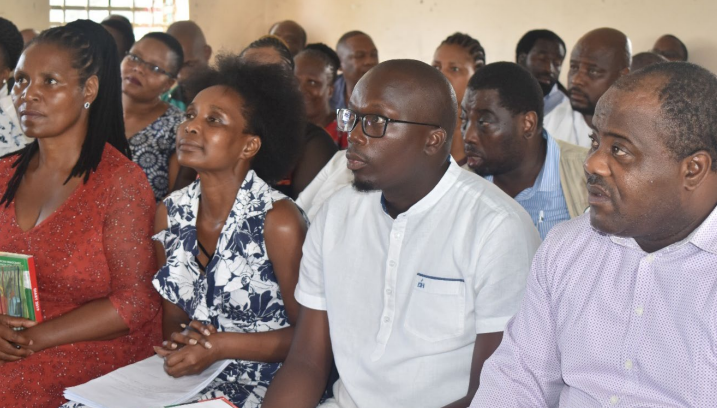Leadership - A Calling to Serve the People (isiZulu)
Story and pictures by Vusi Shabalala
On Thursday 16 January 2020 was the 2nd day of the schools’ functionality and monitoring programme
visit by Members of the Provincial Legislature (MPLs). The delegates targeted Njubanjuba and
Sinenhlanhla Secondary Schools respectively. The school principal of Njubanjuba Secondary School, Ms
P.S. Dlamini, will receive a donations of learner school uniform and water tank, effectively before the
end of January 2020. It is a commitment and not just a joke or a fluke. The announcement came in the
wake of positive academic results –85% matric pass rate that Njubanjuba Secondary School achieved
for the year 2019. The pledge stem from the commitment, dedication, desire and willingness to achieve
good results, which has been held on to by both educators and learners through the academic course.
An official announcement and commitment was made by honourable Mr James Nxumalo, the former
Mayor of eThekwini Municipality and also a serving Member of the Provincial Legislature (MPL) in
KwaZulu-Natal together with the Mayor of Ndwedwe Local Municipality, honourable Mr. Nkosinathi
Chili. They have both committed to donate a set of learner uniform for no less than 10 recipients as
well as a water tank - commonly known as ‘Jojo’, respectively.

Leaders who offered donations: Honourable Mr. James Nxumalo, MPL (far left) and
Honourable Mayor of Ndwedwe Local Municipality, Mr. Nkosinathi Chili (far right)
It is known that Njubanjuba Secondary is also amongst a list of schools that encounter serious
challenges in the area. These include water shortage, sanitation and ablution facilities, burglary and
vandalism, target theft of school nutrition, learner transport and teenage pregnancies.
Notwithstanding the challenges mentioned above, the support from both Messrs. Nxumalo and Chili
display leadership that is embraced by a calling to serve the ‘people’ in need. The commitment and
gesture by both ‘good Samaritans’ reflects something that would make a vast difference, good effect
on the learners, boost to the school’s infrastructure and a great deal of support towards effective and
efficient learning and teaching.
It would be justly agreeable that the two leaders are confined to ‘servant leadership’ that seeks to make
peoples’ lives better. Such character is based on ethical and caring attitude and behaviour that will
enhance a child’s development while improving the caring and quality of young livesthrough education.

Ms. P.S. Dlamini (2nd from left) with her three members of Njubanjuba School Management Team
The Honourable Chairperson of the Portfolio Committee on Education and also Chairperson of the
programme during the entire visits, Mr Jomo Sibiya, has been quite vocal but realistic on the day. As an
advocate of ‘change’ he urged all representatives in attendance, especially those from KwaZulu-Natal
Department of Social Department including those from other provincial departments to focussing in
the provisioning of social work and other services that will offer learner support that will enable
teaching and learning environment conducive. “Small things matter most,” he remarked in confidence.
His other assertions in his speech were directed at the KZN Education Department to consider offering
rewards in the near future to schools that shall have progressed well in the course of the academy. This
will bear a motivating and morale boost.
Mr Sibiya has been determined that “for every problem there shall be a solution”. This means that
solutions should therefore come from the people and be implemented by the people so that the people
could enjoy the fruits of a hard-earned democracy. In his remarks, Mr Sibiya has been pertinent so as
appropriate actions should be implemented accordingly for the benefit of all. This literally
acknowledges and defines him as an individual who has that ability to look at a problem or an institution
from a conceptualizing perspective meaning that one should think beyond day-to-day realities.
It may therefore be better understood to conclude that schools’ functionality and monitoring
programme leaves to us an understanding of a peoples’ character in leadership. It is based upon a belief
that positive character traits can be both taught and learned. It is therefore evident that the programme
advances to teach “all of us” on the effects of community development – “all of us” would include
Government, learners and educators, communities and all stakeholders alike on the particular
character values that include citizenship, caring, responsibility, respect, fairness and trustworthiness.
Often the hardest place to live out our hopes and faith is within the communities who know us best –
whether members of government do things right or wrong. The crux is that when leading a community,
one should have intrinsic values and qualities of ‘leadership’ – a calling to serve the people


